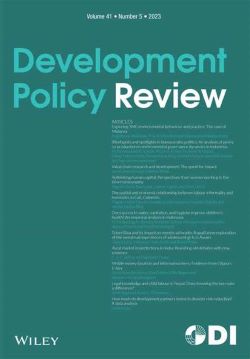Supporting women's empowerment by changing intrahousehold decision making: A mixed methods analysis of a field experiment in rural south-west Tanzania
Abstract
In rural sub‐Saharan Africa, patriarchal social norms and customs often lead to unequal resource access, decision‐making power, and intra‐household power relations between women and men co‐heads of smallholder farm households. Household methodologies are gender‐transformative approaches that aim to achieve gender equality and empower women by improving intra‐household gender relations. Evidence of the impact of such approaches on women's empowerment is still scarce.We assess the effects of a programme that introduces participatory intra‐household decision‐making to challenge gender relations within households on women's empowerment. The programme was delivered to monogamous couples who head smallholder coffee‐farming households in rural south‐west Tanzania.We combine (quasi‐)experimental quantitative and qualitative methods to assess the programme's impact on women's empowerment and how that impact fits with women's valued domains of empowerment and individual pathways to empowerment.Awareness‐raising couple seminars, the programme's least intensive intervention, increased women's access to livestock. Intensive coaching in participatory decision‐making increased women's control over household coffee income—a priority for women. Couple seminars increased women's highly valued involvement in strategic farm decisions—intensive coaching increased it further. Access to personal income, however, valued by women for independent decision‐making for their households' wellbeing, did not change.Gender‐transformative approaches that challenge domestic gender relations can increase women's access to household income and resources, and increase their participation in farming decisions. Such approaches need to be complemented by interventions to increase women's human capital, knowledge of enterprises, and personal resources. Catering for women's diverse pathways towards empowerment may increase their effectiveness. Challenging deep gender norms requires long‐term engagement and trust between change agents and communities.

